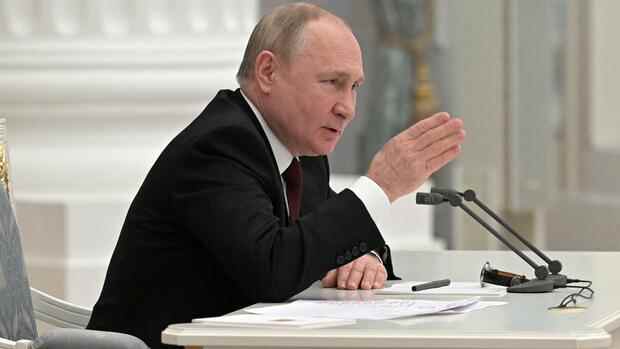Russia’s president is well aware of the domestic effects of his foreign policy activities.
(Photo: via REUTERS)
With the slogan “For a strong Russia”, Vladimir Putin achieved a record result in the 2018 presidential election: almost 77 percent of the voters voted for him. Yes, elections in Russia do not meet Western standards. But there was also no sign of major protests like when Putin returned to the Kremlin in 2012.
The 2018 election was still marked by the annexation of Crimea four years earlier – and first and foremost a referendum on Putin’s foreign policy course. The President learned his lessons: You can win elections with great power politics.
The same pattern can now be observed: Last summer, Putin’s rating was only 61 percent; in the course of the current Ukraine crisis, he has steadily increased it to 69 percent, according to the most recent survey in January.
The Russian ruling elite, too, often pursues foreign policy out of domestic political motives – as in the USA. Of course, the main reason for the escalation of the Ukraine crisis is that Moscow sees Ukraine as its very own sphere of influence.
Top jobs of the day
Find the best jobs now and
be notified by email.
At the same time, of course, Putin is aware of the domestic effects of his aggressive foreign policy. Like Putin himself, many Russians see the fall of the Soviet Union as a disgrace. For them, the collapse of the Red Empire was accompanied by a personal descent, often with a loss of work, prospects and reputation.
>> Read here: The developments on the Ukraine conflict in the Newsblog
The predatory capitalism of the 1990s divided the previously equal collective society into a few super-rich and many poor. And the Russians draw parallels between the injustice at home and that in international politics: They believe that the West does not treat their country as a partnership, but above all patronizes it.
The sense of their own humiliation makes the Russians receptive to aggressive foreign policies. This is, of course, a convenient position for Putin.
With his power games in Ukraine, he has been able to deftly distract from Russia’s real problems: growing social inequality. This is the increasing economic weakness, Russia’s economy is mainly based on the commodity sector. And there is the ever-growing technological gap that the nation of space conquerors has in many other areas compared to modern industrialized countries.
More: Putin achieves important goals without firing a rocket
